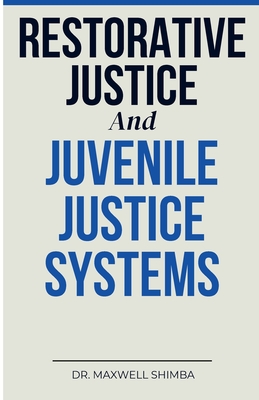Restorative Justice and Juvenile Justice Systems -

Restorative Justice and Juvenile Justice Systems -
Restorative Justice and Juvenile Justice Systems
Restorative Justice and Juvenile Justice Systems by Dr. Maxwell Shimba is a comprehensive exploration of the role of restorative practices in transforming how juvenile offenders are treated within the justice system. Dr. Shimba delves into the conceptual underpinnings of Restorative Justice (RJ), examining its principles of healing, accountability, and community involvement as alternatives to punitive measures. His work highlights how traditional juvenile justice models often fail to rehabilitate young offenders, focusing instead on punishment that can further alienate and stigmatize them. Through detailed case studies and comparative analyses, Dr. Shimba argues that RJ provides a more humane and effective approach to addressing juvenile crime by focusing on reconciliation, personal growth, and reintegration into society.
The book draws on extensive research and empirical data to support its claims about the benefits of RJ in reducing recidivism and promoting rehabilitation. Dr. Shimba carefully examines RJ practices in different jurisdictions, including Family Group Conferencing in New Zealand and Victim-Offender Mediation in Canada, showcasing how these approaches lead to positive outcomes for both offenders and victims. He also discusses the importance of community involvement in the RJ process, emphasizing that sustainable rehabilitation requires collective efforts to support juveniles as they navigate the consequences of their actions. The book's focus on empirical evidence makes a compelling case for the broader adoption of RJ in juvenile justice systems worldwide.
In addition to its theoretical and practical insights, Restorative Justice and Juvenile Justice Systems addresses the challenges and limitations of implementing RJ on a large scale. Dr. Shimba discusses the need for adequate training for RJ facilitators, the importance of victim participation, and the necessity of adapting RJ approaches to more serious or violent crimes. He also tackles criticisms of RJ, including concerns about its perceived leniency and the appropriateness of its use in high-risk cases. Ultimately, the book advocates for a more integrated approach to juvenile justice-one that balances restorative principles with the demands of public safety and justice, offering a path forward for more compassionate and effective juvenile justice reform.
PRP: 105.34 Lei
Acesta este Prețul Recomandat de Producător. Prețul de vânzare al produsului este afișat mai jos.
94.81Lei
94.81Lei
105.34 LeiLivrare in 2-4 saptamani
Descrierea produsului
Restorative Justice and Juvenile Justice Systems
Restorative Justice and Juvenile Justice Systems by Dr. Maxwell Shimba is a comprehensive exploration of the role of restorative practices in transforming how juvenile offenders are treated within the justice system. Dr. Shimba delves into the conceptual underpinnings of Restorative Justice (RJ), examining its principles of healing, accountability, and community involvement as alternatives to punitive measures. His work highlights how traditional juvenile justice models often fail to rehabilitate young offenders, focusing instead on punishment that can further alienate and stigmatize them. Through detailed case studies and comparative analyses, Dr. Shimba argues that RJ provides a more humane and effective approach to addressing juvenile crime by focusing on reconciliation, personal growth, and reintegration into society.
The book draws on extensive research and empirical data to support its claims about the benefits of RJ in reducing recidivism and promoting rehabilitation. Dr. Shimba carefully examines RJ practices in different jurisdictions, including Family Group Conferencing in New Zealand and Victim-Offender Mediation in Canada, showcasing how these approaches lead to positive outcomes for both offenders and victims. He also discusses the importance of community involvement in the RJ process, emphasizing that sustainable rehabilitation requires collective efforts to support juveniles as they navigate the consequences of their actions. The book's focus on empirical evidence makes a compelling case for the broader adoption of RJ in juvenile justice systems worldwide.
In addition to its theoretical and practical insights, Restorative Justice and Juvenile Justice Systems addresses the challenges and limitations of implementing RJ on a large scale. Dr. Shimba discusses the need for adequate training for RJ facilitators, the importance of victim participation, and the necessity of adapting RJ approaches to more serious or violent crimes. He also tackles criticisms of RJ, including concerns about its perceived leniency and the appropriateness of its use in high-risk cases. Ultimately, the book advocates for a more integrated approach to juvenile justice-one that balances restorative principles with the demands of public safety and justice, offering a path forward for more compassionate and effective juvenile justice reform.
Detaliile produsului










